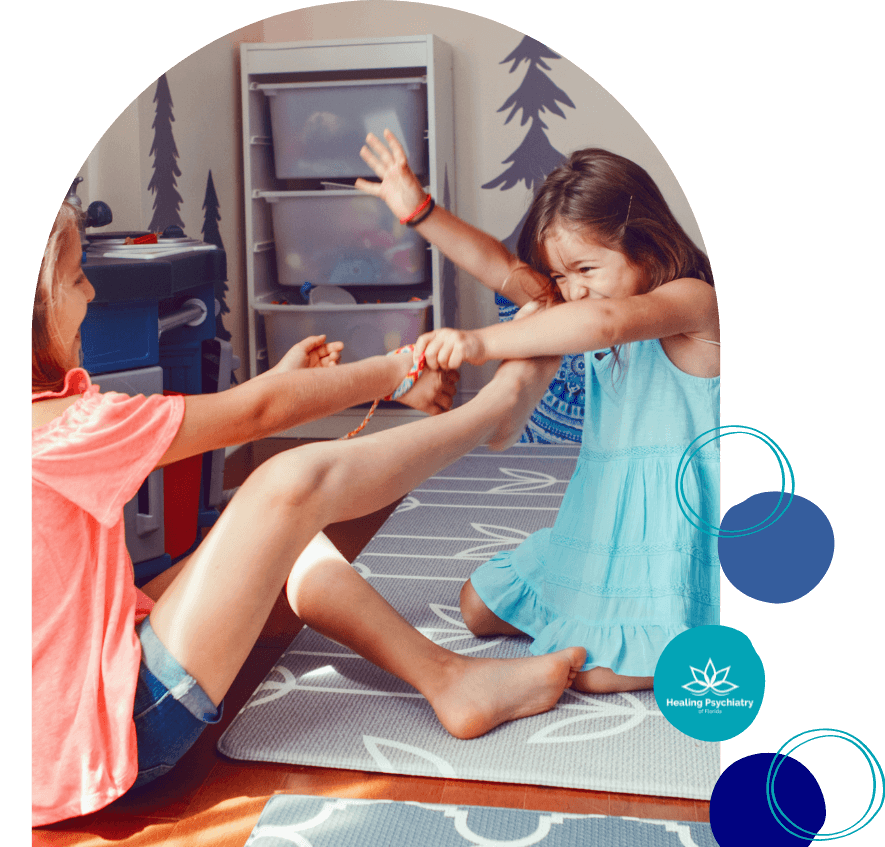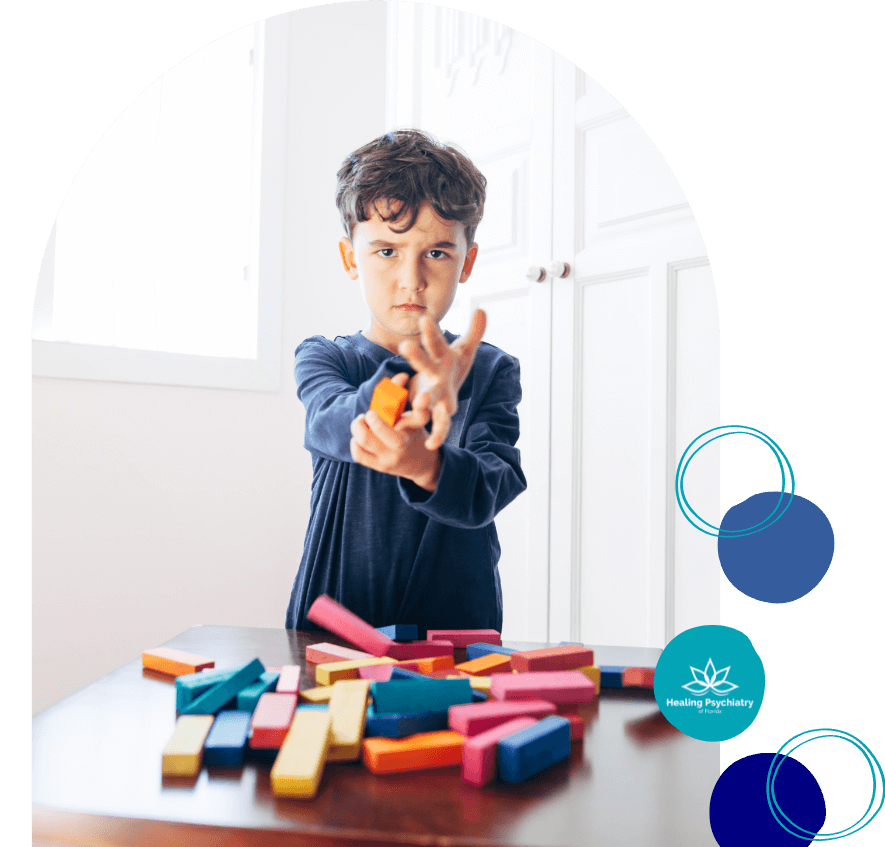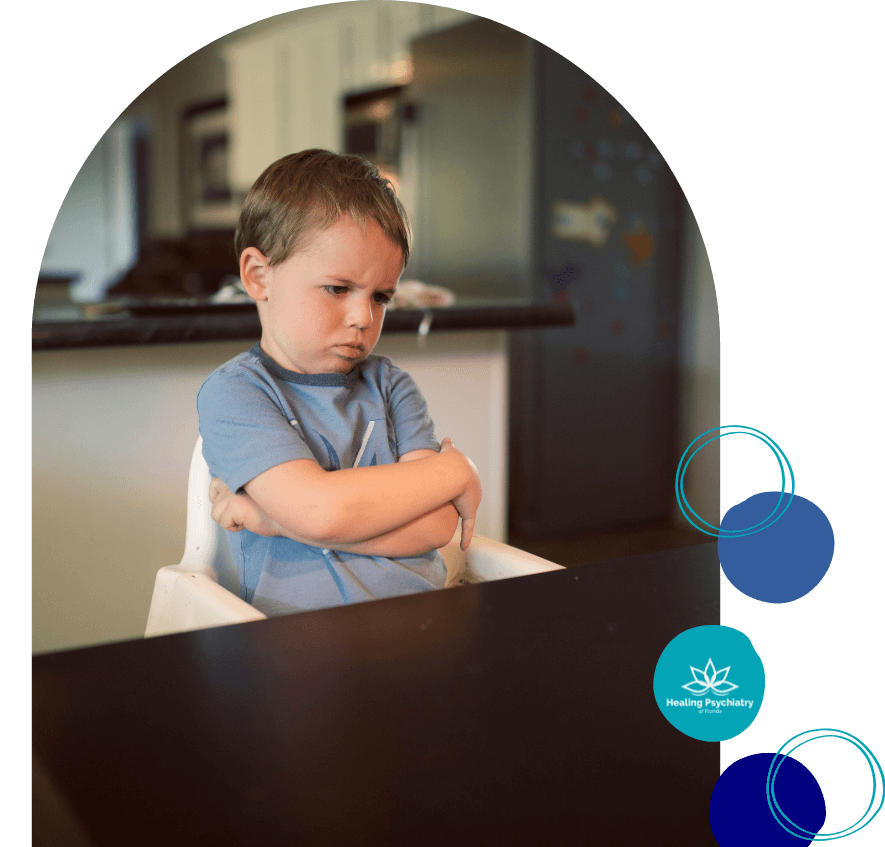Children’s Therapy for Anger
Helping Children Build Emotional Control, Reduce Outbursts, and Learn Healthier Ways to Express Anger.
You may be seeing more than just a bad mood. Frequent anger outbursts, yelling, hitting, or defiance at home and school can signal deeper anger issues. For many parents, the line between “normal frustration” and serious behavioral problems is hard to draw. Whether your child struggles with self-control, lashes out in anger-provoking situations, or becomes withdrawn and aggressive, you’re not just dealing with behavior—you’re facing a possible mental health problem. These patterns often leave families feeling overwhelmed, especially when discipline fails and outbursts escalate.
At Healing Psychiatry of Florida, we provide children’s therapy for anger that is rooted in evidence-based care and developmentally appropriate strategies. Our licensed providers work with both young children and older children, helping them understand their anger triggers, build coping skills, and learn positive behaviors.

Start Your Session Today
What Children’s Therapy for Anger Looks Like
Children’s therapy for anger is structured, personalized, and focused on teaching long-term skills, not quick fixes. Sessions may include talk, play, or creative exercises, but the core goal is always the same: help your child recognize their anger triggers, build emotional awareness, and learn anger control strategies that support safer, more appropriate behavior. For some children, this means reducing aggressive behavior. For others, it means learning to pause, take a breath, and choose a new response.
When a Child’s Anger Becomes Something More
When a child’s anger turns into frequent temper tantrums, rage attacks, or daily angry outbursts, it may point to something deeper than frustration. Therapy helps differentiate typical reactions from signs of disruptive behavior disorders, including oppositional defiant disorder, conduct disorder, or mood-related challenges like depressed mood or severe mood dysregulation. If your child’s angry behavior is affecting relationships with other family members, disrupting school, or putting them at risk socially or emotionally, it’s time to seek support from trained professionals who specialize in mental health treatment for young children.
Anger Management Skills That Actually Work
Our therapists use anger management strategies grounded in evidence-based psychosocial treatments to help children build self-control and develop positive behavior habits. Techniques include consistent consequences, positive reinforcement, and step-by-step coaching to help angry children make better choices in anger-provoking situations. Rather than focusing on punishment, therapy focuses on growth—supporting your child’s efforts to reduce aggressive behavior, follow rules, and respond to limits with more flexibility and resilience.
Teaching Kids to Understand Their Anger Triggers
Kids don’t always know why they feel angry—they just react. In therapy, we help children identify their anger triggers, connect them to emotions, and practice coping skills like deep breathing, role play, and visual reminders. This is how children learn to interrupt the cycle of automatic angry behavior and begin managing anger before it escalates. These skills build confidence, support emotion regulation, and lay the groundwork for better decision-making in everyday problem solving.
Insurances Accepted










See what others are saying about Healing Psychiatry of Florida
Meet Our Anger Therapy Team
Our licensed child therapists specialize in child psychiatry, behavioral disorders, and trauma-informed mental health care for children ages 5 and up. With advanced training in cognitive behavioral therapy, behavioral interventions, and emotional development, our team supports children struggling with anger issues, mental health problems, and related challenges. We are committed to helping each child build real-life skills in self-regulation, expression, and appropriate behavior—while supporting families with strategies that work.




Using Cognitive Behavioral Therapy to Improve Behavior
Cognitive behavioral therapy (CBT) helps children recognize unhelpful thoughts, understand how emotions work, and change the behaviors that follow. This method, combined with art, sand and play therapy is highly effective for managing excessive anger, irritable or depressed mood, and co-occurring concerns like obsessive compulsive disorder or mood disorders. Our therapists use age-appropriate therapy methods to help children link actions to outcomes, take accountability, and develop tools they can carry into daily life—whether they’re at home, at school, or dealing with tough situations with other kids.
Behavioral Interventions That Support Change at Home and School
Our therapy plans include clear, consistent behavioral interventions to help children succeed across environments—not just in the therapy room. When children respond to consistent boundaries and relational safety, they’re more likely to build self-trust, follow through, and grow the problem solving skills they need to thrive.
We draw on cognitive behavioral therapy, behavioral interventions, and collaborative methods to support mental health treatment in ways that are effective and lasting. Our therapists work with your child to build trust, model self-regulation, and shape positive behavior through tools they can actually use in the real world.


What Progress Looks Like in Angry Children
Real progress means fewer angry outbursts, more flexible thinking, and stronger coping when emotions run high. As therapy continues, young children may start using words instead of hitting, while older children begin to reflect, pause, or self-correct. We track your child’s positive behavior and celebrate each gain—whether it’s one fewer temper tantrum, a peaceful bedtime routine, or a calm response to a once-triggering event. Progress is measured in small, steady steps that build lifelong skills.
FAQs for Our Children’s Therapy for Anger
How do I know if my child’s anger is a mental health issue?
If your child’s angry behavior includes frequent temper outbursts, aggression, or intense emotional swings that disrupt daily routines, it could signal an underlying mental health concern. Disorders like oppositional defiant disorder, severe mood dysregulation, or conduct disorder are recognized in the Diagnostic and Statistical Manual, and therapy can help identify what’s driving the behavior and how best to treat it.
Can you help with anger related to family problems or trauma?
Yes. Family dysfunction, stress, or past trauma can all fuel excessive anger in children. Kids may not know how to express fear, sadness, or confusion, so it comes out as rage or defiance. Therapy helps children feel angry in safer, more productive ways—by teaching alternative ways to respond and rebuild trust in their environment.
What is the role of cognitive behavioral therapy in treating anger?
How does therapy help when school is a constant struggle?
By introducing behavioral interventions and consistent expectations across settings, we help children reduce disruptive behavior and increase appropriate behavior in classrooms and with peers. These supports strengthen coping skills and improve social skills, which leads to better performance—and fewer power struggles—at school.
Do you offer resources or referrals outside of therapy sessions?
Yes. We connect families with resources, educational tools, and local programs to strengthen emotional support at home. Our website includes links to parenting guides, videos, and reading materials, and our team can refer you to mental health services, community clinics, or volunteer programs designed for children and families needing additional care.
Can anger be connected to depression or mood disorders in kids?
Absolutely. Children with depressed mood, treating depression concerns, or mood disorders may show anger instead of sadness. This is especially common in older children, who may not recognize or admit emotional distress. Therapy helps uncover the emotion beneath the anger and builds the emotion regulation skills needed to manage both mood and behavior more effectively.
Ready to Take the Next Step?
Your child’s challenges are real—and so is the path forward. Whether it’s focus, behavior, or emotional regulation, early support can make a measurable difference in your child’s mental health and your family’s day-to-day life. We’re here to help you build a plan that works.
Contact us
For more information about our systems and services, contact Healing Psychiatry of Florida.
Healing Psychiatry of Florida
108 W Citrus St, Altamonte Springs, FL 32714
help@healingpsychiatryflorida.com
Opening Hours
Monday – Thursday: 8AM – 7PM
Friday: 8AM – 5PM
Saturday: Closed
Sunday: Closed
OCD Therapy Altamonte Springs, FL
